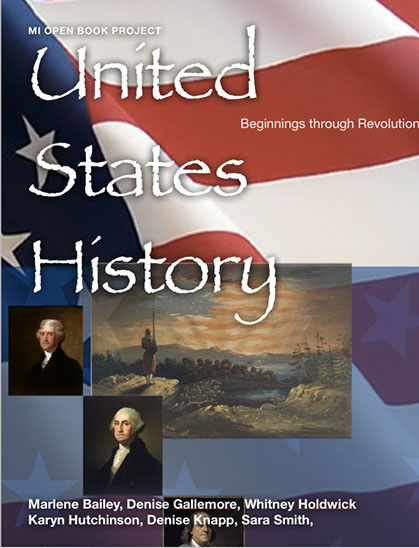

This book is here! Click on the "Downloads" tab above
From the Michigan Content Expectations:
The fifth grade social studies content expectations mark a departure from the social studies approach taken in previous grades. Building upon the geography, civics and government, and economics concepts of the United States mastered in fourth grade and historical inquiry from earlier grades, the fifth grade expectations begin a more discipline-centered approach concentrating on the early history of the United States. Students begin their study of American history with American Indian peoples before the arrival of European explorers and conclude with the adoption of the Bill of Rights in 1791. Although the content expectations are organized by historical era, they build upon students’ understandings of the other social studies disciplines from earlier grades and require students to apply these concepts within the context of American history.
Overview of the MI Open Book Project American History Beginnings - Revolution
Unit 1: Introduction to United States History
Question for Inquiry:
- How did we get where we are now?
Unit 2: Three Worlds Meet
Questions for Inquiry:
- How did the interaction of three different cultural groups lead to a massive change in how the world worked?
- How did Native Americans adapt to their locations?
- How did the location of the three West African empires impact the cultural and economic development of each?
- How did exploration change the world?
Chapter 1: North America: The First Peoples
Chapter 2: Africa: West African Empires
Chapter 3: Europe
Chapter 4: Three Worlds Meet
Unit 3: Colonization and Settlement
Questions for Inquiry:
- How did exploration lead to colonization?
- How would the geographic features and economic activities of the southern region lead to the development of slavery in the South?
- How did the Church of England influence the founding of the New England colonies?
- What would motivate other European nations to colonize in the New World?
Unit 4: Life in the Colonies
- Questions for Inquiry: What drove each of the colonies to develop as they did?
- How did religion and geography affect the way the colonies developed?
Chapter 1: Designing America
Chapter 2: The Best Fit/Where Do I Fit
Chapter 3: Differing Economies
Chapter 4: Slavery in the South
Unit 5: Road to Revolution
Question for Inquiry:
- How did the attitudes and beliefs of the Colonial American people change towards Great Britain and why?
Chapter 1: French and Indian War
Chapter 2: Road to Self-Government
Chapter 3: 13 Colonies Rebel
Unit 6: The Revolution
Questions for Inquiry:
- How did the colonists justify their right to rebel? How did a small group of revolutionaries persuade a whole nation to give up everything they had ever known?
- How did the colonists justify their right to rebel?
- How did the colonists feel as they made the decision to reject Parliaments demands ?
- Have you ever read something so powerful that it changed your mind?
- Why do you think it was time for the colonists to declare their Independence?
- How did women, Native Americans, and African Americans help shape the outcome of the war?
- How did different groups come together to overcome the most powerful nation in the world at the time?
Chapter 1 -No choice but to Fight
Chapter 2 - Declaring Independence to the King
Chapter 3 -Ending Battles & Outcomes
Chapter 4 - Roles of ALL during this Period
Unit 7: A New Nation
Questions for Inquiry:
- Why do we need rules in school? In our classroom?
- Why do we need a government?
- If something seems unfair, what can you do to change it?
- How did the changing nation come together to create a unified government?
- How did so many ideas become one government?
Chapter 1. The Articles of Confederation
Chapter 2. The Constitutional Convention
Chapter 3. The Constitution

Contact the Project Manager: david.johnson@wmisd.org
These materials were developed under a grant awarded by the Michigan Department of Education.
